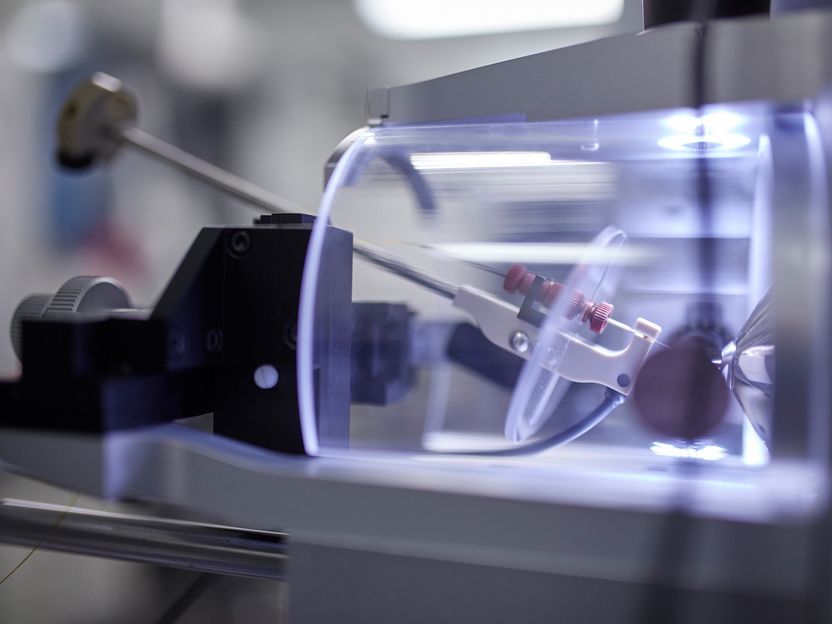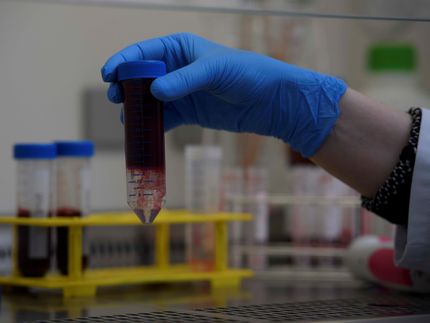Could the blood of COVID-19 patients be used to predict disease progression?
Study discovers differences in the blood samples of severe and mild cases
Researchers from Charité – Universitätsmedizin Berlin and the Francis Crick Institute have identified 27 proteins which are present at different levels in the blood of Covid-19 patients, depending on the severity of their symptoms. These biomarker profiles could be used to predict disease progression and make it easier for doctors to decide which type of treatment to use.

Researchers used mass spectrometry to identify biomarker profiles which can be used to classify disease severity in patients with COVID-19. These biomarker profiles could also be used to predict disease progression.
Arne Sattler/Charité
People respond very differently to infection with the novel coronavirus (SARS-CoV-2). While some patients develop no symptoms at all, others will develop severe disease and may even die. For this reason, there is an urgent need for ‘biomarkers’, quantifiable biological characteristics which could provide a reliable means of predicting disease progression and severity. A research team led by Prof. Dr. Markus Ralser (Director of Charité’s Institute of Biochemistry, holder of an Einstein Professorship and Group Leader at the Francis Crick Institute) used state-of-the-art analytical techniques to rapidly determine the levels of various proteins in the blood plasma. This approach enabled the researchers to identify various protein biomarkers in the blood plasma of patients with COVID-19 which were linked to the severity of their disease.
The researchers developed a precise, high-throughput mass spectrometry platform capable of analyzing the patients’ proteomes – the compendium of proteins found in biological material – at a rate of 180 samples per day. Using this technology, the team analyzed blood plasma samples from 31 men and women who were receiving treatment at Charité for COVID-19 of varying degrees of severity. The researchers were able to identify 27 proteins in the blood which varied in quantity depending on disease severity. The researchers then validated these molecular signatures by analyzing samples from another group of 17 COVID-19 patients and 15 healthy people. Protein expression signatures were able to precisely classify patients according to the World Health Organization’s coding criteria for COVID-19.
“These results lay the foundations for two very different applications. One possible future use would be for disease prognosis,” explains Prof. Ralser, who is also group leader at the Francis Crick Institute in London. “An early blood test would enable the treating physician to predict whether or not a patient with COVID-19 will develop severe symptoms. This could potentially save lives: the sooner physicians know which patients will require intensive care, the faster they can make use of the available treatment options.” In order to get closer to this goal, the researchers will now study how the biomarker signatures change over the course of the disease.
“Another possible future use would be as an in-hospital diagnostic test, which could provide clarity regarding a patient’s condition – regardless of how they themselves describe it,” explains the biochemist. He adds: “In some cases, a patient's symptoms do not appear to provide an accurate picture of their true health status. An objective evaluation, based on their biomarker profile, could be extremely valuable in this regard.” The research team now plan to test their new method in a larger number of patients in the hope of getting closer to developing a diagnostic test.
Changes in the protein profile
Some of the 27 proteins which were found to predict the severity of COVID-19 had not previously been linked to an immune response. However, the biomarkers identified by the researchers also included clotting factors and regulators of inflammation. Some of these proteins act on interleukin 6 (IL-6) at the molecular level. IL-6 is a protein which is known to cause inflammation, and which, according to preliminary studies, is associated with severe COVID-19 symptoms. A number of the biomarkers identified as part of this study might therefore be suitable targets for treatment.
Original publication
These products might interest you
See the theme worlds for related content
Topic World Mass Spectrometry
Mass spectrometry enables us to detect and identify molecules and reveal their structure. Whether in chemistry, biochemistry or forensics - mass spectrometry opens up unexpected insights into the composition of our world. Immerse yourself in the fascinating world of mass spectrometry!

Topic World Mass Spectrometry
Mass spectrometry enables us to detect and identify molecules and reveal their structure. Whether in chemistry, biochemistry or forensics - mass spectrometry opens up unexpected insights into the composition of our world. Immerse yourself in the fascinating world of mass spectrometry!
























































